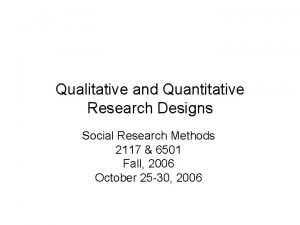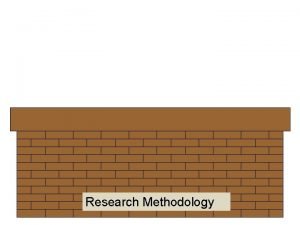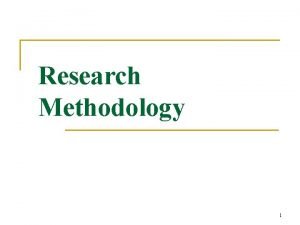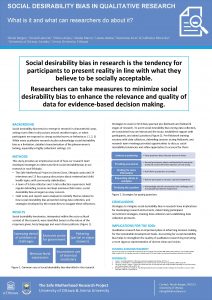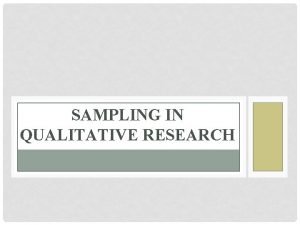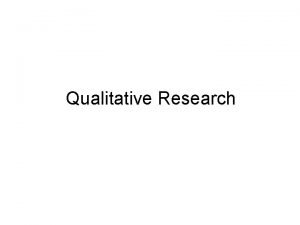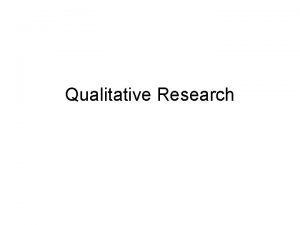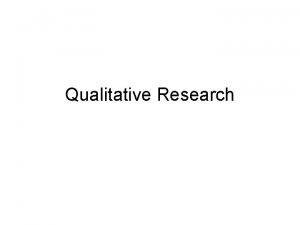Session 1 2 Traditions of Qualitative Research Contents

















- Slides: 17

Session 1. 2 Traditions of Qualitative Research 主讲人:夏代英

Contents The General Introduction of Qualitative Research l The Influential Traditions of Qualitative Research in Education Disciplinary influences l Continental influences Ideological influences Political influences l Discussion

Introduction of Qualitative Research l Qualitative research is a method of inquiry employed in many different academic disciplines, traditionally in the social sciences, but also in market research and further contexts. Qualitative researchers aim to gather an indepth understanding of human behavior and the reasons that govern such behavior. The qualitative method investigates the why and how of decision making, not just what, where, when. Hence, smaller but focused samples are more often needed, rather than larger samples. The three most common qualitative methods, are: participant observation, in-depth interviews, and focus groups. l

Introduction of Qualitative Research l The history of qualitative research in education in the United States is rooted in early American sociology and anthropology, and it also has ties to English and French intellectual traditions. l Its development cannot be understood by looking only at academe, but influenced by disciplinary, continental, ideological and political elements.

The Influential Traditions of Qualitative Research in Education l l Disciplinary influences Continental influences Ideological influences Political influences

Disciplinary Influences 1. Anthropologists and sociologists lay the foundation of field research. l Bronislaw Malinowski—Cultural anthropologist. The first professional anthropologist to describe how he obtained his data and what the fieldwork experience was like. (observations) l Margaret Mead—anthropologist, who made the earliest substantive application of anthropology to U. S. education. (She argued that teachers needed to study, through observations, firsthand experiences, the changing contexts of their students’ socialization and upbringing in order to become better teachers. )

Disciplinary Influences 2. The field research of anthropologists was an important source for the model of what is known as Chicago sociology. Chicago School—a group of sociological researchers teaching and learning at the sociology department of the University of Chicago in the 1920 s and 1930 s, contributed enormously to the development of the research method we refer to as qualitative. l Some common concepts Chicago sociologists shared: Firstly, shared some common theoretical and methodological assumptions. Secondly, relied on firsthand data gathering for their research. (Robert Park) Thirdly, emphasized city life. (by way of scientific mosaic) l Chicago School’s contributions to qualitative research: Firstly, studies from Chicago sociologists illustrate both the interests in different aspects of ordinary life and an orientation to the study of ethnicity. Secondly, in their emphasis on the intersection or social context and biography lies the root of contemporary descriptions of qualitative research as holistic. Thirdly, they emphasized the importance of seeing the world from the perspective of those who were seldom listened to—the vagrant, the criminal…

Disciplinary Influences 3. The Sociology of Education l l The discipline of the sociology of education was predominantly quantitative except for the work of Willard Waller described the social world of teachers and their students by in-depth interviews, life histories, participant observation, case records, diaries, letters, and other personal documents.

Continental Influences 1. European connections l Work in Britain and France, as well as other parts of Europe, during the 19 th and 20 th centuries, reflected qualitative approaches to understanding people’s lives, as researchers studied groups of people by living with them and trying to understand their perspectives. e. g. 1. Frederick Le. Play and his colleges studied working-class families through the method he called “observation” (Their work: Les Ouvriers, 1879) e. g. 2. Henry Mayhew presented life histories and the results of extensive, in-depth interviews with the poor. (His work: London Labor and the London Poor, 1851— 1862) e. g. 3. Charles Booth, a statistician, whose work contained extensive and detailed descriptions of the people he studied.

Continental Influences 2. North America (USA social survey movement) e. g. 1. Du. Bois undertook the first social survey in the USA. His survey included interviews and observations with informants living primarily in the city’s Seventh Ward. (His book, The Philadelphia Negro, 1899) e. g. 2. One of the most prominent social surveys was Pittsburgh Survey, undertaken in 1907. It bulges with detailed descriptions、 interviews、 portraits and photographs.

Continental Influences 3. What European Connections and the Social Survey Movement make contributions to qualitative research: l All of the researchers on both sides of the Atlantic addressed from various l standpoints, a variety of social concerns in the fields of education, human services, poverty, social welfare, and urban life. the work of both groups contributed to including the perspectives or voices of traditionally under-represented constituencies in the dialogue. (e. g. Du Bois)

Ideological Influences 1. Ideological and Political Practice influence qualitative research Ideological issues were also central to the traditions of qualitative l l approach. That is, the doing of qualitative research reflects particular relationships to how power is distributed in a society. Qualitative methods make contributions to democracy and justice. Because of its democratic emphasis, the ease the qualitative methods attends to the perspectives of those not traditionally included in mainstream research studies, and the strengths of the qualitative approach for describing the complexities of social conflicts.

Ideological Influences 2. Ideologies and Social Change influence qualitative research e. g. 1. During the Depression in the USA , many scholars turned to a qualitative approach to document the nature and extent of the problems. And documentary photography was used to examine the dimensions of sufferings of dispossessed American people. e. g. 2. In the 1940 s, qualitative researchers took up asymmetrical power relations concerning gender by in-depth interview. (e. g. Mirra Komarovsky ) e. g. 3. The 1960 s brought national focus to educational problems, revived interest in qualitative research methods, and opened up educational research to this approach. In the 1960 s, qualitative research begin to emerge from its long hibernation in education.

Ideological Influences The reasons: l Firstly, the social upheaval of the 1960 s indicated to many that we did not know enough about how students experienced school; l Secondly, popular accounts exposed for education what nineteen-century muckraking revealed about social welfare. Thirdly, qualitative methods gained popularity because of their recognition of the views of the powerless and the excluded—those on the “outside. ” l l The climate of the times renewed interest in qualitative methods, created a need for more experienced mentors of this research approach, and opened the way for methodological growth and development.

Political Influences l What did political issues influence upon qualitative research l The political upheaval around issues of rights and privilege challenged the idea of studying “unspoiled” societies. l During the 1960 s, the field of sociology turned to the writings of phenomenologists. And the interest in qualitative methods was kindled by the publication of a number of theory and methods books. During the 1970 s, ideological conflicts also developed over the style and orientation of qualitative methods. At the time, ethnomethodological contributions to the study of gender was significant, particularly in the construct of “doing gender”. Other ideological strands of the qualitative approach include feminism, postmodernism, critical race theory (CRT), and critical theory. l

Discussion What are the strengths of quantitative research? l What are the limitations? l What are the strengths of qualitative research? l What are the limitations? l What are the strength of mixed methods approach? (for thinking after class) l

Thank you!
 Qualitative research traditions
Qualitative research traditions Qualitative research traditions
Qualitative research traditions Appendix example in research
Appendix example in research What is research instrument
What is research instrument Quantitative vs qualitative experiment
Quantitative vs qualitative experiment What is qualitative research
What is qualitative research Define research methodology
Define research methodology Examples of continuous variables
Examples of continuous variables Session 1 research simulation task
Session 1 research simulation task Findings of qualitative research
Findings of qualitative research What is grounded theory in qualitative research
What is grounded theory in qualitative research Group studied is smaller and not randomly selected
Group studied is smaller and not randomly selected Methodological integrity
Methodological integrity What is a survey research method
What is a survey research method Social desirability bias in qualitative research
Social desirability bias in qualitative research What is the sample size in qualitative research?
What is the sample size in qualitative research? Sampling techniques in research example
Sampling techniques in research example Results and discussion in qualitative research
Results and discussion in qualitative research




